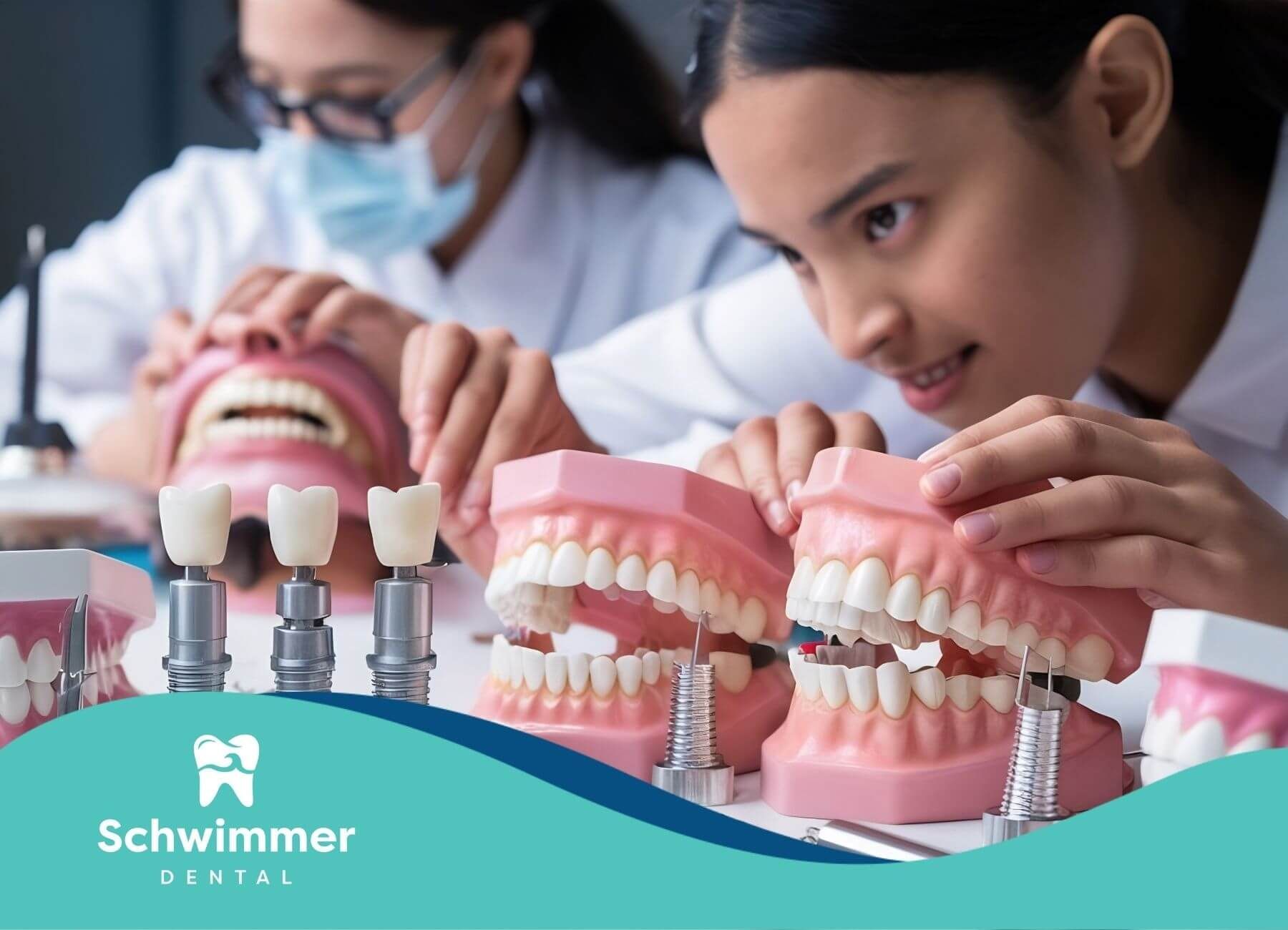Dental Understanding Gender Differences in Oral Hygiene and Gum Health
Key Highlights
- Research shows clear gender differences in oral health, with women generally practicing better hygiene habits.
- Hormonal changes in women can increase gum sensitivity and risk for disease.
- Men face higher risks of gum disease and oral cancer, often due to lifestyle habits.
- Women seek preventive care more often, leading to healthier long-term outcomes.
- Understanding these differences helps us create personalized care plans for every patient.
At Schwimmer Dental, we often explain to our patients that oral health isn’t one-size-fits-all. Men and women share the same teeth and gums, but their biological makeup, hormones, and daily habits can affect oral health in very different ways.
As a dental professional, I’ve seen how these subtle differences shape everything from gum sensitivity to how quickly cavities form. By understanding these gender-based variations, we can tailor preventive care and treatment to help every patient maintain a confident, healthy smile.
Biological Differences Between Men and Women
Gender-related oral health differences start at the biological level. While everyone faces risks like plaque buildup or gum inflammation, women’s hormones fluctuate more dramatically throughout life—especially during puberty, pregnancy, and menopause.
These hormonal shifts influence how gums respond to bacteria and can make them more prone to swelling or bleeding.
Men, on the other hand, tend to have more stable hormone levels. However, they’re not in the clear—genetics and lifestyle choices often put them at higher risk for gum disease and oral cancer.
Some studies even suggest that women’s tooth enamel might be slightly more resistant to acid erosion, offering minor protection against decay.
How Hormones Affect Oral Health in Women
- Puberty: Rising estrogen and progesterone levels increase gum blood flow, causing tenderness or mild inflammation (“puberty gingivitis”).
- Pregnancy: Hormone surges can lead to “pregnancy gingivitis,” where gums become more sensitive and bleed easily.
- Menopause: Decreased estrogen may cause dry mouth and jawbone density loss, raising the risk of tooth loss or sensitivity.
We recommend women stay extra vigilant during these hormonal phases—consistent brushing, gentle flossing, and more frequent cleanings can make a big difference.
Common Oral Health Conditions by Gender
Both men and women experience oral health challenges, but the root causes often differ. Women are more likely to face issues linked to systemic or hormonal changes, while men’s risks tend to stem from behavioral and lifestyle patterns.
Women’s Oral Health Risks
Women are more prone to:
- Osteoporosis, which may weaken the jawbone and lead to tooth loss.
- Sjögren’s Syndrome, an autoimmune condition causing dry mouth and higher cavity risk.
- Enamel erosion from acid reflux or eating disorders.
Men’s Oral Health Risks
Men face higher rates of:
- Periodontal (gum) disease, often linked to neglecting oral hygiene.
- Oral cancer, frequently tied to tobacco and alcohol use.
- Tooth decay, influenced by sugary or acidic drink consumption.
We always remind our male patients that gum disease doesn’t just affect your mouth—it’s connected to heart disease, diabetes, and other serious conditions.
Oral Hygiene Behaviors and Dental Visits
Behavior plays a huge role in long-term dental health. In our practice, we often see that women are more consistent and proactive about oral care. They brush and floss more regularly, and they’re nearly twice as likely as men to keep up with dental check-ups and cleanings.
Men, by contrast, tend to visit only when something hurts. Unfortunately, that reactive approach can turn small issues into big ones. Preventive visits not only save money—they protect your overall well-being.
Quick Comparison: Oral Care Behaviors
| Habit | More Common in Women | More Common in Men |
|---|---|---|
| Toothbrushing & flossing | ✅ Consistent daily habits | ❌ Often irregular |
| Dental visits | ✅ Preventive & scheduled | ❌ Usually symptom-driven |
| Oral health awareness | ✅ High literacy & motivation | ❌ Lower awareness |
We advise all our patients—especially men—to think of dental care as maintenance, not repair.
Attitudes and Awareness Toward Dental Care
How you think about oral health can influence how well you care for it. Research (and experience) shows women generally have a more positive attitude toward dental care, often viewing it as part of overall wellness.
Men, meanwhile, sometimes associate dental visits with fear, discomfort, or unnecessary expense. Social and cultural norms can play a role too—some men feel they should “tough out” pain rather than seek help.
As dental professionals, we work hard to break that stigma. Seeking care isn’t weakness—it’s strength. Preventing disease before it starts is the smartest thing you can do for your health.
Gender-Specific Dental Care Recommendations
Personalized care makes all the difference. While everyone benefits from good hygiene and routine checkups, we tailor our advice to fit each patient’s unique needs.
For Women
- Be aware of how hormonal changes affect your gums.
- Schedule more frequent cleanings during pregnancy or menopause.
- Discuss any medications, like birth control or hormone therapy, with your dentist.
For Men
- Prioritize regular check-ups, even when nothing hurts.
- Reduce tobacco and alcohol use, which raise your oral cancer risk.
- Maintain daily brushing and flossing—gum disease prevention starts at home.
Our goal at Schwimmer Dental is to help every patient—regardless of gender—understand their risks and take control of their oral health through personalized, preventive care.
The Lifestyle Connection
Your daily habits directly influence your mouth’s health. National data shows men are more likely to smoke, drink heavily, and consume sugary drinks—all major contributors to cavities, gum disease, and oral cancer.
We’ve seen firsthand how small lifestyle changes—like switching to water, quitting tobacco, or brushing after meals—can dramatically improve oral well-being. Remember: your mouth is the gateway to your overall health. Taking care of it benefits your entire body.
Conclusion
In my experience, understanding how gender affects oral health helps patients make smarter, more informed choices. From hormonal shifts to lifestyle differences, men and women face distinct challenges—but both can achieve lifelong oral wellness with the right care and consistency.
If you’re ready to take a more personalized approach to your oral health, our team at Schwimmer Dental is here to help. We specialize in preventive and cosmetic dentistry that keeps every smile—male or female—healthy, confident, and bright.
Ready to take charge of your smile? Schedule your next dental visit in New Jersey with our friendly team today.
Frequently Asked Questions
1. Are women really more likely to visit the dentist?
Yes. Studies show women are nearly twice as likely as men to schedule preventive check-ups, which helps explain their lower rates of gum disease and tooth loss.
2. How do hormones affect oral health?
Fluctuating hormones—especially during puberty, pregnancy, and menopause—can make gums more sensitive and reactive to plaque, increasing the risk of inflammation.
3. What are the most common gender-based oral health issues?
Men are more prone to gum disease, tooth loss, and oral cancer, while women are more likely to experience hormonal-related issues, dry mouth, and osteoporosis-linked jawbone loss.
Sources:
- https://www.sciencedirect.com/science/article/pii/S1013905218302232
- https://pmc.ncbi.nlm.nih.gov/articles/PMC9604615/
- https://pmc.ncbi.nlm.nih.gov/articles/PMC9359402/
- https://www.sciencedirect.com/science/article/pii/S0300571222002135
- https://pubmed.ncbi.nlm.nih.gov/35545161/



